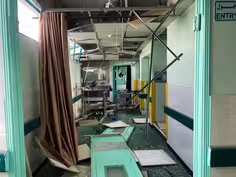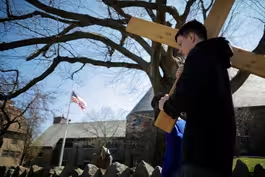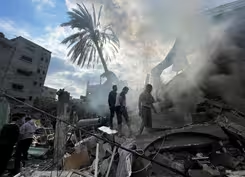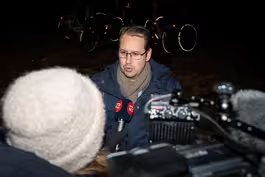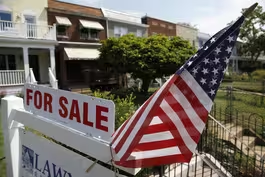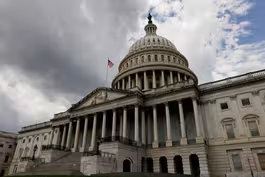
Putin vows to press on with Ukraine invasion despite losses
Clip: 12/14/2023 | 9m 4sVideo has Closed Captions
Putin vows to press on with Ukraine invasion despite heavy Russian losses
Russian President Vladimir Putin held his first press conference that included international media in more than two years and insisted that he would continue to wage war in Ukraine until all his goals were met. Much of what he had to say bears directly on how the U.S. and Europe help Ukraine going forward. Nick Schifrin discussed more with Thomas Graham of the Council on Foreign Relations.
Problems playing video? | Closed Captioning Feedback
Problems playing video? | Closed Captioning Feedback
Major corporate funding for the PBS News Hour is provided by BDO, BNSF, Consumer Cellular, American Cruise Lines, and Raymond James. Funding for the PBS NewsHour Weekend is provided by...

Putin vows to press on with Ukraine invasion despite losses
Clip: 12/14/2023 | 9m 4sVideo has Closed Captions
Russian President Vladimir Putin held his first press conference that included international media in more than two years and insisted that he would continue to wage war in Ukraine until all his goals were met. Much of what he had to say bears directly on how the U.S. and Europe help Ukraine going forward. Nick Schifrin discussed more with Thomas Graham of the Council on Foreign Relations.
Problems playing video? | Closed Captioning Feedback
How to Watch PBS News Hour
PBS News Hour is available to stream on pbs.org and the free PBS App, available on iPhone, Apple TV, Android TV, Android smartphones, Amazon Fire TV, Amazon Fire Tablet, Roku, Samsung Smart TV, and Vizio.
Providing Support for PBS.org
Learn Moreabout PBS online sponsorshipWILLIAM BRANGHAM: Russian President Vladimir Putin today held his first press conference that included international media in more than two years.
And, as Nick Schifrin reports, he insisted that he would continue to wage war in Ukraine until all his goals were met.
(APPLAUSE) NICK SCHIFRIN: Across four stage-managed hours, in front of an audience of 600, Russian President Vladimir Putin said he had no intention of ending the war in Ukraine anytime soon.
VLADIMIR PUTIN, Russian President (through translator): There will be peace when we achieve our goals.
They have not changed, the denazification of Ukraine, its demilitarization, and its neutral status.
NICK SCHIFRIN: And even though a new U.S. assessment says 315,000 Russian troops have been killed or wounded, Putin expressed confidence Russia was winning.
VLADIMIR PUTIN (through translator): Almost along the entire line of contact, our armed forces, to put it modestly, are improving their position.
Almost everyone is active throughout the entire front line.
NICK SCHIFRIN: That includes strikes on Ukrainian critical infrastructure.
Ukraine says Russia attacked Odesa overnight with more than 40 drones.
Ukraine's air defense worked, but the debris of a shot-down drone gutted an apartment complex, and left Inna and her 3-year-old homeless.
INNA, Ukraine Resident (through translator): I cannot even describe it with words.
There was a big fire, smoke.
It felt as if it was in slow motion.
NICK SCHIFRIN: Part of Putin's confidence today was from what he suggested was a slow-motion weakening of Ukraine's Western support.
VLADIMIR PUTIN (through translator): Today, Ukraine produces almost nothing.
They get a freebie for everything.
But these freebies may end someday.
NICK SCHIFRIN: Ukraine had been worried about European Union support.
But today in Brussels, the European Council announced it would invite Ukraine to begin a path toward membership.
But U.S. funding to Ukraine still hangs in the balance.
Despite Zelenskyy's visit this week, congressional negotiators are struggling to approve $60 billion of aid to Ukraine before they leave for the holidays.
JOHN KIRBY, NSC Coordinator For Strategic Communications: They need our help, and they need it right now, not after the eggnog.
NICK SCHIFRIN: Today, National Security Council spokesman John Kirby cited Putin's words to those blocking Ukraine funding.
JOHN KIRBY: But I sure hope that House Republicans who have for months held hostage critical assistance Ukraine heard Putin's message loud and clear.
Instead, they're heading home for the holidays.
NICK SCHIFRIN: In the meantime, Moscow still holds wrongfully detained Americans, former Marine Paul Whelan and The Wall Street Journal's Evan Gershkovich, whose detention was extended today.
The U.S. says Russia recently rejected a prisoner swap offer.
But, today, Putin said he was open to a deal.
VLADIMIR PUTIN (through translator): We want to make an agreement, and that agreement should be mutually accepted and satisfy both sides.
NICK SCHIFRIN: Today, State Department spokesman Matt Miller encouraged Putin to consider U.S. proposals to swap Gershkovich and Whelan, and that -- quote -- "We very much want a deal."
We turn now to Thomas Graham, who served on the National Security Council staff and at the State and Defense departments.
He's now a distinguished fellow at the Council on Foreign Relations.
Thomas Graham, thank you very much.
Welcome back to the "NewsHour."
As we just heard, Putin repeated the same objectives about Ukraine that he has been using since before the full-scale invasion began.
What does that say about his intentions for the war?
THOMAS GRAHAM, Council on Foreign Relations: Well, it says quite clearly that he intends to continue the struggle.
He certainly believes that time is on his side.
He has fended off the Ukrainian counteroffensive.
He sees evidence of infighting in the Ukrainian leadership.
And, as you have already mentioned, support in the West is flagging.
I mean, we have this problem in the Congress right now as far as funding is concerned.
So, all this has really reconfirmed Putin in his conviction that the Russians are more resilient, we have -- time is on our side, we need to continue to press forward.
NICK SCHIFRIN: President Biden repeatedly says that Putin believes that Russia can outlast Western support for Ukraine.
How much is Putin counting on the U.S. being unable to continue maintaining its support for Ukraine at the levels it has been?
THOMAS GRAHAM: I think that is at the top of his mind at this point.
He has thought that from the very beginning.
He begins to see evidence of that.
And he is hoping that, as we get deeper into the political season in 2024 and closer to the elections, that we will see even more flagging support for Ukraine.
I think this is critical in his mind to Ukraine -- to Russia finally achieving whatever its goals are in Ukraine.
NICK SCHIFRIN: And yet, on the battlefield, we don't see very much evidence that Russia is able to take the initiative or achieve any more territory than it already has.
Does Putin actually believe that Russia is winning in Ukraine?
THOMAS GRAHAM: Well, certainly, when he looks at the way things are tending, I would argue that he does believe that Russia is winning and that it can win.
That said, it is clear that they haven't made much progress on the ground.
And he could be setting himself up for a fall, because the expectation now is, particularly with flagging interest in the West, eyes focused on Gaza, that Russia should be making substantial progress on the ground in Ukraine.
That is going to be quite difficult.
And three or four weeks from now, we may be seeing a quite different Putin as he discusses the situation in Ukraine.
NICK SCHIFRIN: Let's expand out to Russia's economy.
Today, Putin claimed that the Russian economic growth was 3.5 percent this year.
At the same time, the Treasury Department released a new statement today saying U.S. and European sanctions had -- quote -- "put Russia's economy under considerable economic strain."
Have the sanctions put Russia's economy under considerable economic strain?
THOMAS GRAHAM: Well, I think the Treasury is thinking about the long term, and that is clearly true.
Short term, the sanctions haven't had the impact that the United States and the West in general had hoped for.
Putin has put the economy, his economy, on a war footing.
He's poured much money into military production.
He's managed to find ways to circumvent the $60 cap on oil, and, therefore, oil revenue is flowing into Russia's state coffers.
That allows him to continue to fund the military operation.
But I think, as you look at this down the road farther into the future, you see a situation that will be very difficult for Russia to sustain the economic growth that it is seeing in the current year.
NICK SCHIFRIN: Does that mean the sanctions are unlikely to affect any short-term thinking by Putin or even ability for Russia to wage war?
THOMAS GRAHAM: No, I think that's absolutely true.
The sanctions have had very little impact on Russia's ability to conduct this war short term.
They have had very little impact on the way the Kremlin thinks about the situation the ground.
Five, 10 years from now is a different story, but that's not where Putin is focused.
He certainly believes that he will achieve his goals in Ukraine much before that.
NICK SCHIFRIN: We call this Putin's annual press conference because it is usually annual, but last year's was canceled.
What does it say about the fact that he held this press conference with domestic, with international media?
What does it say about his confidence levels and what is what does it say about his hold on power?
THOMAS GRAHAM: Well, it certainly says that he's much more confident about his own situation, Russia's situation than he was a year ago.
Remember, a year ago at this time, the Ukrainians had launched a very successful counteroffensive, taken back Kharkiv oblast, liberated the city of Kherson.
This was not the time that Putin wanted to be speaking to the Russian public about how things were tending.
This year is quite different.
Russia appears to be doing OK on the ground in terms of pushing back against the Ukrainian counteroffensive.
But the other thing I think you need to bear in mind is that Putin is facing a presidential election in March of next year.
Now, there's no doubt that he's going to win that election, but it's very important for his own sort of political authority to put the best face possible on Russia's situation, to underscore the successes that Russia has had under his leadership.
And I think that's one of the reasons he decided to hold this annual press conference this year.
NICK SCHIFRIN: Thomas Graham of the Council on Foreign Relations, thank you very much.
THOMAS GRAHAM: Thank you.
Gaza civilians face new threat with spread of disease
Video has Closed Captions
Clip: 12/14/2023 | 5m 55s | Gaza civilians caught in crossfire face new threat with spread of deadly diseases (5m 55s)
How some evangelicals are combating political radicalization
Video has Closed Captions
Clip: 12/14/2023 | 8m 4s | How some evangelical leaders are combating political radicalization in their congregations (8m 4s)
Israel says war will continue 'more than several months'
Video has Closed Captions
Clip: 12/14/2023 | 3m 14s | Israel says Gaza war will continue 'more than several months' amid pressure for cease-fire (3m 14s)
News Wrap: Authorities arrest 7 accused of plotting attack
Video has Closed Captions
Clip: 12/14/2023 | 3m 25s | News Wrap: Authorities arrest 7 accused of plotting Europe terror attack (3m 25s)
Real estate commission challenges could shake housing market
Video has Closed Captions
Clip: 12/14/2023 | 8m 49s | Lawsuits challenging real estate commission could shake up housing market (8m 49s)
Rush's Geddy Lee reflects on music and life in new memoir
Video has Closed Captions
Clip: 12/14/2023 | 7m 24s | Rush frontman Geddy Lee reflects on his music and life in a new memoir (7m 24s)
What needs to happen to pass Ukraine aid, border funding
Video has Closed Captions
Clip: 12/14/2023 | 5m 59s | What needs to happen for Congress to pass funding for Ukraine aid and border security (5m 59s)
Providing Support for PBS.org
Learn Moreabout PBS online sponsorshipSupport for PBS provided by:
Major corporate funding for the PBS News Hour is provided by BDO, BNSF, Consumer Cellular, American Cruise Lines, and Raymond James. Funding for the PBS NewsHour Weekend is provided by...
